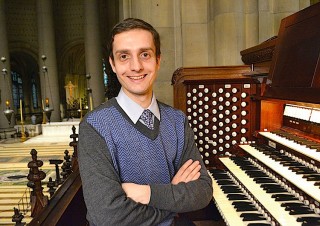Column Name
Title

Doctoral student Raymond Nagem at his day job, as the assistant organist at the Cathedral of St. John the Divine.
(Photo by ProOrgano.com)The life of an organ scholar isn’t quite all stops and pedals, though a lot of it is, as this Wednesday in September in the life of doctoral student Raymond Nagem (M.M. ’10, organ) reveals. Ray, who is from Medford, Mass., teaches the required Organ Literature class for undergrads and is the associate organist at the Cathedral of St. John the Divine, where he works for the director of music, Kent Tritle (B.M. ’85, M.M. ’88, organ; M.M. ’88, choral conducting; faculty). Oh, and Ray is also working on his dissertation on Serge Koussevitsky and the Boston Symphony Orchestra.
Body
8 a.m. Wake up and glance at my email. Nothing seems to need immediate attention, so I make myself some breakfast and go through my plans for the day.
9 a.m. Out the door and onto the subway from my apartment on 149th Street to the Cathedral of St. John the Divine on 110th.
9:30 a.m. Time for a staff meeting at St. John the Divine with Kent Tritle. Our meetings cover everything from nuts-and-bolts details about services to long-term plans for our large and growing music program. The special item this week is an interfaith service Al Gore is planning to attend after the People’s Climate March [on September 21].
10:30 a.m. Practice on the cathedral’s small studio organ. I have a lot to get through in a short time—Mozart, Reger, and Duruflé for an October recital in Missouri, Bach for a November program in New York City—and many accompaniments for cathedral services, including a wonderful new Te Deum by New York composer David Hurd. With so much to cover, I try to keep up my mental energy, often bouncing back and forth between sections or different pieces. I avoid too much repetition of the same passage—if something really isn’t working, I’ll leave it and come back to it later.
1 p.m. Grab a sandwich at a deli near the cathedral. I’m rarely without something to read, either an ebook on my phone or (preferably) a real book, so I steal a few moments for something that isn’t music-related. For light reading at the moment I’m enjoying the wickedly clever Thursday Next books by Jasper Fforde.
1:30 p.m. Office work. There’s no way to sugarcoat this: a huge portion of a working musician’s time is spent answering email. Then there are always documents to proofread, music to file, and visiting musicians who need rehearsal times organized.
3:20 p.m. I head down to Juilliard and review my notes and handouts for the Organ Literature course I teach—it starts at 4 p.m. Organists regularly play repertoire covering 500 years—a longer span than any other instrument—so this is truly a survey course, covering everything from medieval monks to the aesthetics of postmodernism. On the agenda today is early English music: Byrd, Gibbons, Tomkins, and Purcell.
5:50 p.m. Grab a quick dinner, head back up to St. John the Divine and look over some music—Bach, Parry, and the Britten Festival Te Deum—for our weekly choir rehearsal.
7 p.m. Rehearsal with our volunteer Cathedral Chorale. I work alongside Kent and Malcolm Merriweather, a doctoral student at the Manhattan School of Music—and conduct for part of the rehearsal and play piano for the rest.
9:35 p.m. More practice. Since I’m tired by this point in the day, I keep things relatively short and focus on a few key spots.
11:10 p.m. Return home and relax with some reading. I have stacks of books to digest for my doctoral dissertation, and I’m working through the Renaissance chapters in H. W. Janson’s History of Art.
12:30 a.m. Go to sleep. Our Organ Performance class is tomorrow morning, and I’m slated to play six miniatures by Reger from memory, so I need a decent night’s rest!




